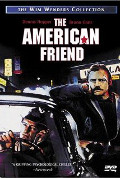
USA/France/Germany 1977
Directed by
Wim Wenders
125 minutes
Rated M
Reviewed by
Bernard Hemingway

The American Friend
Anyone who got wind that The American Friend is based on Patricia Highsmith's “Ripley's Game”, and came to it expecting a conventional Hollywood adaptation along the lines of Anthony Minghella's The Talented Mr. Ripley (1999) or Liliana Cavani's Ripley’s Game (2002), the latter a version of this story, would be sorely disappointed by Wim Wenders’s New Wave mindbender. Even without such expectations the film is not easy to swallow whole
Tom Ripley is running a scam selling paintings by a supposed dead artist (played by Nicholas Ray). At an art auction in Berlin where one of the bogus paintings is to be sold he overhears that a picture framer, Jonathan Zimmermann (Bruno Ganz), has a terminal blood disease. In order to pay back a debt, Ripley sets up Jonathan to receive a handsome pay-off if he will kill a known gangster in Paris. The latter agrees to do so but when he is approached to make a second hit he demurs and Ripley has to help him out. That’s about all you need to know about the plot for after that the film runs off the rails into near Ealing Studios farce as crooks start chasing crooks and the body count builds up.
The best thing about The American Friend is Wenders’ regular cinematographer Robby Müller who creates some marvelously hyper-real imagery of the alienated urban landscape, particularly artificially-lit interiors and exteriors at either the very end or the very beginning of day.
The worst thing is the structure which makes the bad mistake of breaking the story into two parts – that of the two hits and then what happens after. If the first part is off-hand enough in pacing and character dynamics it is the picture of tautness compared to the second part in which Wenders indulges in distracting theatrics which are more typical of 1970s fondness for existential gestures than suited to the thriller story. One can see all the elements here of a strong film, it is a pity that Wenders felt the need to embellish them with his penchant for artiness rather than concentrating on the gripping psychological drama which is at its heart. Such are the perils of auteurism.
Want something different?





